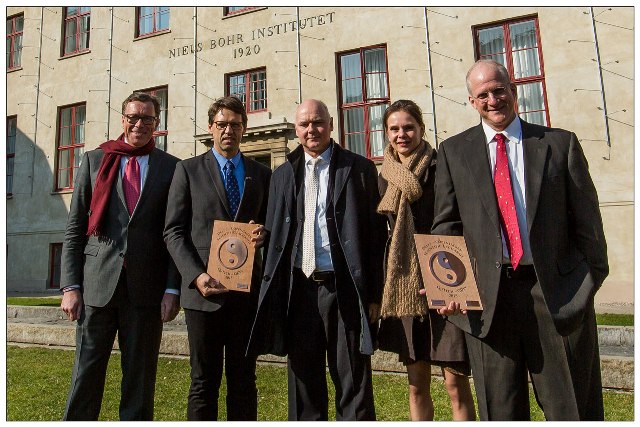Mar 18 2015
Research collaboration
What do you do when you have two of the leading giants in the same research field? – compete with each other? – fight each other? – no, you start collaborating. The Center for Quantum Devices, QDev at the Niels Bohr Institute at the University of Copenhagen and QuTech at Delft University of Technology in Holland have therefore entered into an international partnership in the research of quantum technologies. The collaboration will be celebrated with an official ceremony with the attendence of ministers from both countries and the Dutch royal couple.
 Center for Quantum Devices, QDev at the Niels Bohr Institute at the University of Copenhagen and QuTech at Delft University of Technology in Holland have entered into an international partnership in the research of quantum technologies. From left is Dirk Jan van der Berg, President of Technical University, Delft, Leo Kouwenhoven, Director of QuTech, Thomas Bjørnholm, Prorector of University of Copenhagen, Dutch Ministry of Economic Affairs Freeke Heijman-te Paske and Charles Marcus, Director of QDev.
Center for Quantum Devices, QDev at the Niels Bohr Institute at the University of Copenhagen and QuTech at Delft University of Technology in Holland have entered into an international partnership in the research of quantum technologies. From left is Dirk Jan van der Berg, President of Technical University, Delft, Leo Kouwenhoven, Director of QuTech, Thomas Bjørnholm, Prorector of University of Copenhagen, Dutch Ministry of Economic Affairs Freeke Heijman-te Paske and Charles Marcus, Director of QDev.
Both research centres work with computer science based on the laws of quantum physics. Quantum physics is experimentally proven, but has not yet been used in practice for computer technology. Quantum computers will bring computer technology to a whole new level and open up new opportunities for security. Because development is currently very strong in this field, the two research centres agreed that it would be of great strategic and economic value to work together.
“With the growing complexity of quantum information and computation technology, combining efforts—as we are doing with this declaration—is hardly a choice anymore. Exchanging ideas, techniques, education, and especially personnel makes everything easier, hopefully easy enough to succeed. Bohr understood the value of international cooperation, and has been a distinguishing characteristic of the Niels Bohr Institute for its start until now,” says Charles Marcus, professor and head of the Center for Quantum Devices at the Niels Bohr Institute at the University of Copenhagen.
Official ceremony with ministers and royalty
The collaboration will commence 17 March with an official ceremony during which both parties will sign a so-called, Memorandum of Understanding, which describes the terms and agreements between the two parties. The two top researchers and centre heads are Professor Marcus, who is the director of the Center for Quantum Devices at the Niels Bohr Institute and Professor Leo P. Kouwenhoven, who is the director of QuTech at the Delft University of Technology. The first part of the ceremony will take place at the Niels Bohr Institutte and in addition to a number of key people within the research field, the Dutch Minister of Economic Affairs, Freeke Heijman-te Paske and the Danish Minister for Higher Education and Science, Sofie Carsten Nielsen attend.
Then the participants will go to Christiansborg, where the signing itself will take place with the participation of the Danish Prime Minister Helle Thorning-Schmidt and the Dutch royal couple, King Willem-Alexander and Queen Máxima, who are on an official visit.
Joint plan for groundbreaking results
The Memorandum of Understanding states that they will work on a joint plan for achieving groundbreaking results in quantum information based on topological particles that exist in certain materials. The idea is that by controlling these particles electrically, they can be woven around each other, resulting in interactions that produce information – quantum information. The research also aims to use advanced materials to develop nanoelectrics comprised of semiconducting nanowires. In addition, they will share research facilities and exchange both researchers and students.
“Now, from the start of the second century of quantum mechanics, we are making formal what much of the scientific community already knows: cooperation, not competition, works best. We also must recognize that scientific ideas and engineering approaches are merging, challenging traditional university boundaries, scale, budget, and training strategies. Removing those boundaries is also a big part of the QuTech-QDev Technical Exchange Program,” says Charles Marcus.
After the official programme on 17 March, there will be a scientific programme on 18 March, which will be held at the Center for Quantum Devices, QDev at the Niels Bohr Institute.